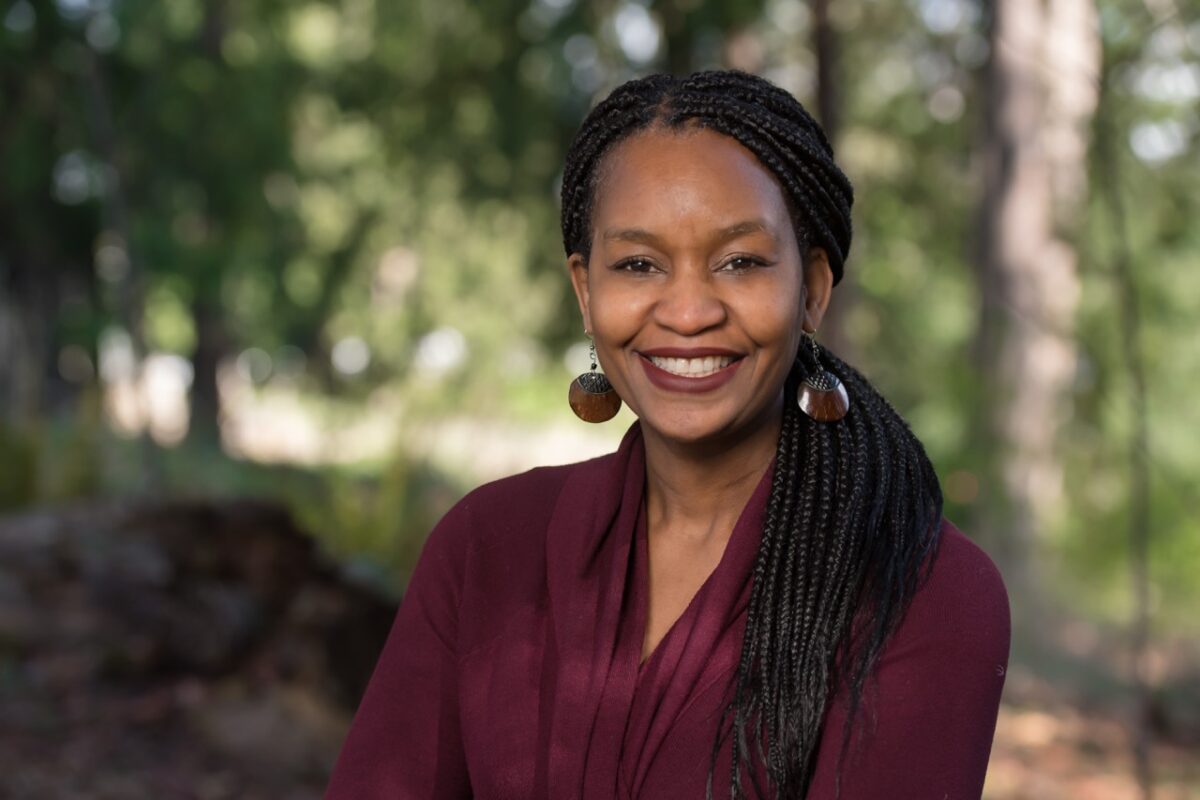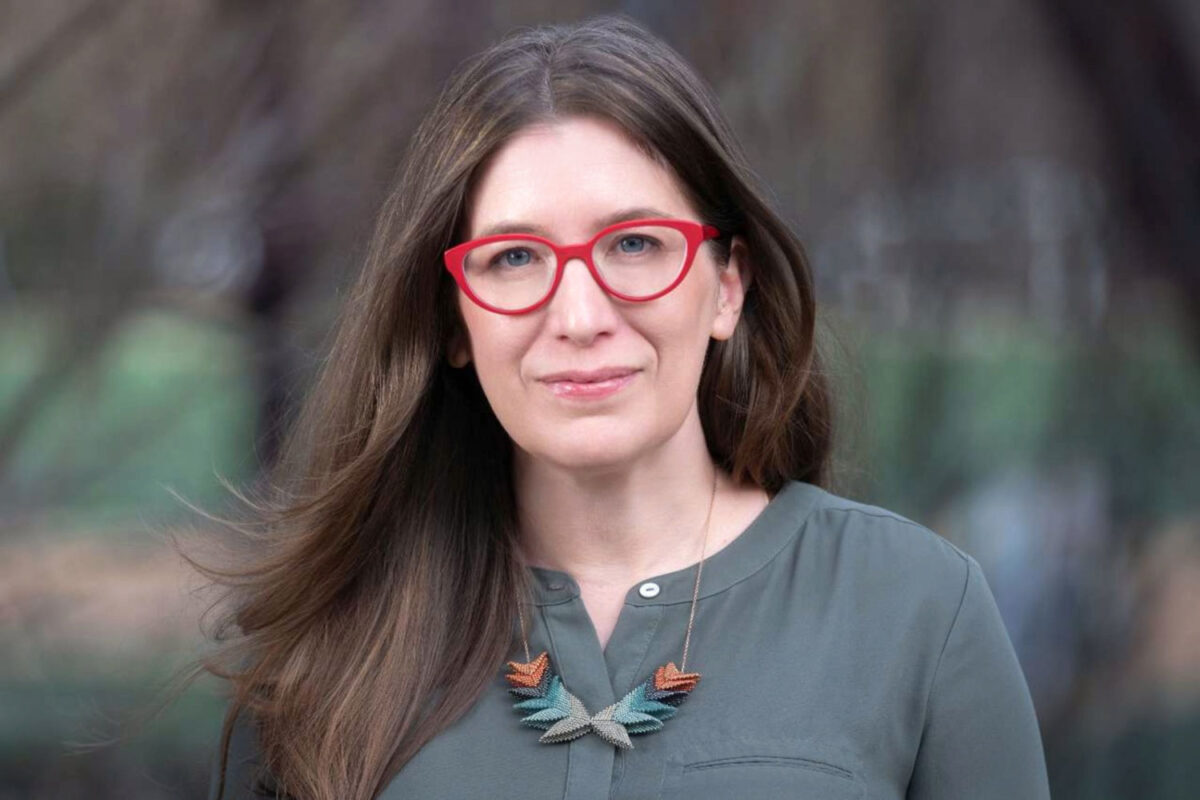For more than 15 years, associate professor Dr. Shauna Elbers Carlisle has taught at the University of Washington Bothell’s School of Interdisciplinary Arts & Sciences. Throughout her teaching, she always looks to bring community engagement and service to communities with limited representation into her courses. Her public service work, however, extends outside the classroom.
Each year, UW Bothell honors staff and faculty service efforts that address critical societal issues, contribute to an engaged citizenry, strengthen democratic values and civic responsibility, and contribute to the public good. As recipient of the 2023 Outstanding Public Service Award, Elbers Carlisle has a long record of meaningful service to the campus community and beyond.
In its letter to Dr. Sharon A. Jones, vice chancellor for Academic Affairs, the selection committee recommended Elbers Carlisle for the award “for continually creating equal opportunities for vulnerable groups and supporting the development and evaluation of critical social welfare services.”
Rooted in service
For Elbers Carlisle, public service was ingrained in her from a young age. Immigrants from the Caribbean, her parents were one of the founding families of a Caribbean organization in Manitoba, Canada, where she grew up.
She remembers her parents always working in and for the community, and she often spent her weekends joining them. Her mother was a member of a nurse’s union, and Elbers Carlisle recalls joining her during three strikes as a child, including the longest nurses’ strikes in Canada’s history.
“I developed a very strong appreciation for what it means to advocate for wellness and the rights of people and the workers,” Elbers Carlisle said.
She recalls the dedication of the nurses who continued to show up in weather that was 40 degrees Celsius below zero because administrators did not believe that the nurses (mostly women) would strike if they delayed negotiations until winter.
“That had a major impact on me and shaped my values,” she said. “We have a very strong sense of the good of the whole, meaning that everything you do in your work is to benefit everyone and to think about the community before you take action. It was strongly impressed on us as kids, and especially as Black immigrants, that political representation and engagement matter, and that when you walk out of the house, you’re representing a community.”
Growing up with these values of community service and engagement, Elbers Carlisle began envisioning a future in public service from a young age.
While working on her bachelor’s degree in psychology at the University of Manitoba, she also discovered an interest in social work — and followed that path to the University of Washington. There, she earned a Master of Social Work degree in Administration & Policy and a doctorate in Social Welfare.
A career in service
At UW Bothell, Elbers Carlisle has been a member of more than 10 committees and working groups.
“My service at the campus and institutional level involves building the capacity for collaborative and deliberative civic processes,” she said. “I am also committed to fair political representation and social responsibility.”
She recently chaired the General Faculty Organization, a forum for faculty deliberation and decision-making and for conveying faculty recommendations to campus leadership.
“We work together to improve processes, communication and how information is shared with faculty and other stakeholders. Our aim is to ensure that policies and procedures do not move quicker than input from those who deliver on our responsibilities to the students,” she said. “There’s a lot that I enjoy in doing this work and being part of this collective effort.”
One of Elbers Carlisle’s most impactful contributions to the UW Bothell community has been the co-development of the Community-Based Learning Scale. In the study, “The Impact of Community-Based Learning on Civic Engagement,” Elbers Carlisle and her colleagues evaluated the long-term impact of community-based learning on student engagement using a 33-item scale. They found that most students reported a significant improvement in their civic engagement after completing a community-based learning course.
Put in place in 2011, the scale is now used as an instrument for measuring civic engagement, self-awareness and critical thinking among UW Bothell students.
Engaging communities
In her work with partner organizations, Elbers Carlisle uses a community-based program evaluation to find ways to improve the organizations’ impact and effectiveness. After conducting surveys and assessments, she reports her findings with recommendations for where she sees opportunities for positive change.
Most of this work revolves around policy, program evaluation, assessment and strategic planning. In particular, she said she aims to ensure the impact of an organization is equitable across all intended recipient groups.
“My interests are in nonprofit organizations that serve people living with mental illnesses, drug and alcohol use; children; people of color; and just generally diverse groups of people — anything I can do to help smaller organizations specifically improve and think about how different policies and processes could serve to enhance people’s lives or take away from it.”
Elbers Carlisle has partnered with organizations ranging from Big Brothers Big Sisters of Puget Sound and the King County Housing Authority to the Washington State Fathers Network and New Traditions addiction treatment program. She also incorporates her students into many of her community-based program evaluation projects.
“Shauna’s community projects are strongly aligned with UW Bothell’s transformational undergraduate and graduate research vision. She ensures students learn professional skills that can be used within community organizations, particularly program evaluation,” the award selection committee noted.
“Understanding that community programs lack resources to assess the impact of their services, having students learn these skills in her statistics class opens up economic opportunities, provides collaborative learning communities and simulates real-world project experiences.”
Shauna’s community projects are strongly aligned with UW Bothell’s transformational undergraduate and graduate research vision. She ensures students learn professional skills that can be used within community organizations, particularly program evaluation.
Award Selection Committee
Inspiring others
As much of Elbers Carlisle’s teaching revolves around statistics and methodological approaches, she said it is important to first get to the “why” of any particular matter — which for her is a passion for social welfare.
“I ask students, ‘Why do you care about this class?’ And then we look at the impact of statistics on our lives and how it informs policies and all these other areas of our lives,” she said. “We think about what it means for us to be researchers in these spaces and to collect data from people. What is the right way to ask questions? How do we ensure our population sample represents all people? How do we interpret our findings and what are the implications for our population?”
The driving force in statistics, she noted, is to provide factual information back to stakeholders in a way that can be used to improve outcomes. Many of her class assignments center around social service and welfare issues, giving students insight into how their analysis can inform change.
“I want students to leave my classes understanding that even these methodological courses, these tools, can be used to serve the public,” she said.
In her Approaches to Social Research class, for example, Elbers Carlisle worked with the King County Housing Authority to conduct a customer-satisfaction program evaluation. Undergraduate students conceptualized, designed and executed all aspects of the research, including survey development, data collection, data analysis, and dissemination and presentation of findings.
In a project for RHealth — a research group focused on racial disparities in health for which Elbers Carlisle is the principal investigator — students of color collaborate with one another to conduct community canvassing and to develop critical approaches to community and behavioral health research.
“Representation matters in my community work, and students become closely acquainted with the impact representation and racial and ethnic congruence can have on receptivity to our health messages,” Elbers Carlisle said.
She added that many of her students have continued to do community engagement work after they graduate, either working on the same projects or finding new ways to use the skills they developed to support other projects.
The work continues
In looking at all her work to create equal opportunities for vulnerable groups and to support the development and evaluation of critical social welfare services, Elbers Carlisle said she finds it difficult to see what she’s accomplished.
“I never thought of getting an award or being publicly recognized because the work is just necessary to have a fair and just society,” she said. “Though there may be different periods and seasons, it’s ongoing.”
Elbers Carlisle said the highlight of her public service work has been her colleagues.
“No effective public service can be done on one’s own. It requires collaboration and recognition that everyone has expertise,” she said. “The people I work with are what has kept me enjoying the work here. They’ve become my friends and community.”
Her students, of course, are another highlight — as is the ability to involve them in her work and pass along to to the next generation her passion for community engagement and public service.
“I am honored to have been nominated for this award. At the beginning of my career, I made the decision that my education would be used to contribute to the community’s common good,” Elbers Carlisle said. “UW Bothell has afforded me the opportunity to align my service with my values and desire to improve the well-being of the communities I am a part of and in service to.”




